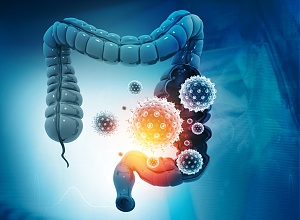There is a clear link between taking antibiotics and an increased risk of developing colon cancer within the next five to 19 years, found a Umeå University, Sweden, study of 40,000 cancer cases.
The impact of antibiotics on the intestinal microbiome is thought to lie behind the increased risk of cancer.
“The results underline the fact that there are many reasons to be restrictive with antibiotics. While in many cases antibiotic therapy is necessary and saves lives, in the event of less serious ailments that can be expected to heal anyway, caution should be exercised. Above all to prevent bacteria from developing resistance but, as this study shows, also because antibiotics may increase the risk of future colon cancer,” explains Sophia Harlid, cancer researcher at Umeå University.
In the study, published in the Journal of the National Cancer Institute, the researchers says they found that both women and men who took antibiotics for more than six months ran a 17% greater risk of developing cancer in the ascending colon, the first part of the colon to be reached by food after the small intestine, than those who were not prescribed any antibiotics. However, no increased risk was found for cancer in the descending colon. Nor was there an increased risk of rectal cancer in men taking antibiotics, while women taking antibiotics had a slightly reduced incidence of rectal cancer.
The increased risk of colon cancer was visible already five to 10 years after taking antibiotics. Although the increase in risk was greatest for those taking most antibiotics, it was also possible to observe an admittedly small, but statistically significant, increase in the risk of cancer after a single course of antibiotics.
The present study uses data on 40,000 patients from the Swedish Colorectal Cancer Registry from the period 2010-2016. These have been compared with a matched control group of 200,000 cancer-free individuals drawn from the Swedish population at large. Data on the individuals' antibiotic use was collected from the Swedish Prescribed Drug Register for the period 2005-2016. The Swedish study broadly confirms the results of an earlier, somewhat smaller British study.
To understand how antibiotics increase the risk, the researchers also studied a non-antibiotic bactericidal drug used against urinary infections that does not affect the microbiome. There was no difference in the frequency of colon cancer in those who used this drug, suggesting that it is the impact of antibiotics on the microbiome that increases the risk of cancer. While the study only covers orally administered antibiotics, even intravenous antibiotics may affect the gut microbiota in the intestinal system.
"There is absolutely no cause for alarm simply because you have taken antibiotics. The increase in risk is moderate and the affect on the absolute risk to the individual is fairly small. Sweden is also in the process of introducing routine screening for colorectal cancer. Like any other screening programme, it is important to take part so that any cancer can be detected early or even prevented, as cancer precursors can sometimes be removed," says Harlid.
Study details
Antibiotics Use and Subsequent Risk of Colorectal Cancer: A Swedish Nationwide Population-Based Study
Published in the Journal of the National Cancer Institute on 1 September 2021
Abstract
Background
Antibiotics use may increase colorectal cancer (CRC) risk by altering the gut microbiota, with suggestive evidence reported. Our study aims to investigate antibiotics use in relation to subsequent CRC risk.
Methods
This is a nationwide, population-based study with a matched case-control design (first primary CRC cases and 5 matched, cancer-free controls). Complete-population data, extracted from Swedish national registers for the period 2005-2016, were used to calculate odds ratios and 95% confidence intervals.
Results
We included 40 545 CRC cases and 202 720 controls. Using the full dataset, we found a positive association between more frequent antibiotics use and CRC, excluding antibiotics prescribed within 2 years of diagnosis attenuated results toward the null. In site-specific analyses, excluding the 2-year washout, the positive association was confined to the proximal colon (adjusted odds ratio for very high use vs no use = 1.17, 95% confidence interval = 1.05 to 1.31). For rectal cancer, an inverse association, which appears to be driven by women, was observed. Quinolones and sulfonamides and/or trimethoprims were positively associated with proximal colon cancer, whereas a more general inverse association, across antibiotics classes, was observed for rectal cancer. We found no association between methenamine hippurate, a urinary tract antiseptic not affecting the gut microbiota, and CRC risk.
Conclusions
This register-based study covering the entire population of Sweden found a robust association between antibiotics use and higher risk of proximal colon cancer and an inverse association with rectal cancer in women. This study strengthens the evidence from previous investigations and adds important insight into site-specific colorectal carcinogenesis.
See more from MedicalBrief archives:
Antibiotics may affect some cancer treatment outcomes
ACS recommends earlier colorectal cancer screening

